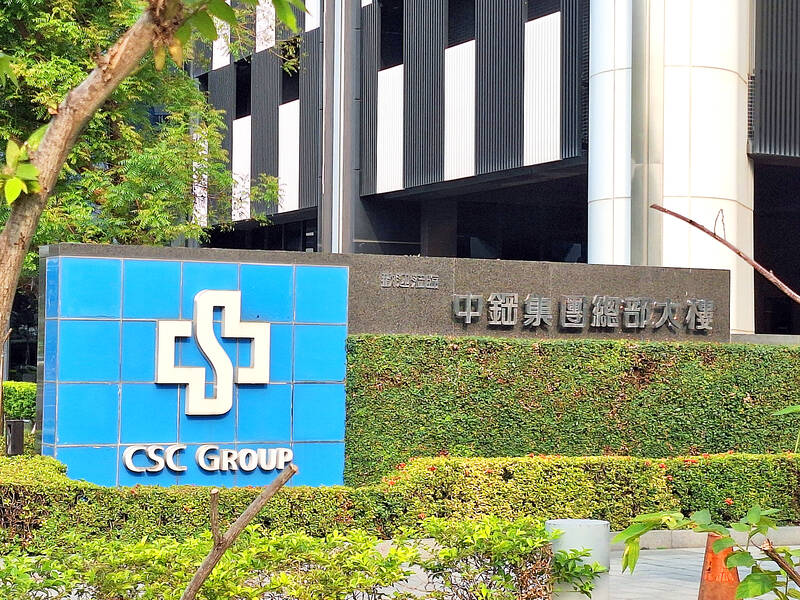China Steel Corp (中鋼), the nation’s biggest steelmaker, yesterday announced sweeping price cuts by NT$600 per tonne for domestic delivery next month in response to customers’ conservative demand prospects as they grapple with volatility in foreign exchange rates.
The Kaohsiung-based company’s move came after sharp appreciation of the New Taiwan dollar versus the US dollar is posing a risk to the nation’s export growth momentum, although the nation’s economy is showing resilient growth toward an annual expansion of 2.9 percent this year estimated by the IMF, the company said in a statement.
“Customers are adopting a wait-and-see approach recently, as the downstream processing industry is taking hit from dramatic revaluation of the NT dollar lately,” China Steel said. “To help downstream steelmaking customers safeguard their competitiveness in taking new orders, the company is cutting prices extensively for June deliveries.”

Photo: CNA
The downward price adjustments on the company’s major products aligned with the weakening steel prices in Asia, such as Angang Steel Co (鞍本鋼鐵) in China lowering prices for certain steel plates recently and Formosa Ha Tinh Steel Corp (台塑河靜鋼鐵興業) in Vietnam trimming hot-rolled steel prices by US$17 per tonne during its latest price quotes, China Steel said.
At the same time, there are signs that demand in the US and European markets is sliding, while costs of raw materials, including iron ore and coking coal, hold steady at between US$95 and US$100 per tonne and in the range from US$185 to US$195 per tonne respectively, the company said.

SETBACK: Apple’s India iPhone push has been disrupted after Foxconn recalled hundreds of Chinese engineers, amid Beijing’s attempts to curb tech transfers Apple Inc assembly partner Hon Hai Precision Industry Co (鴻海精密), also known internationally as Foxconn Technology Group (富士康科技集團), has recalled about 300 Chinese engineers from a factory in India, the latest setback for the iPhone maker’s push to rapidly expand in the country. The extraction of Chinese workers from the factory of Yuzhan Technology (India) Private Ltd, a Hon Hai component unit, in southern Tamil Nadu state, is the second such move in a few months. The company has started flying in Taiwanese engineers to replace staff leaving, people familiar with the matter said, asking not to be named, as the

The prices of gasoline and diesel at domestic fuel stations are to rise NT$0.1 and NT$0.4 per liter this week respectively, after international crude oil prices rose last week, CPC Corp, Taiwan (台灣中油) and Formosa Petrochemical Corp (台塑石化) announced yesterday. Effective today, gasoline prices at CPC and Formosa stations are to rise to NT$27.3, NT$28.8 and NT$30.8 per liter for 92, 95 and 98-octane unleaded gasoline respectively, the companies said in separate statements. The price of premium diesel is to rise to NT$26.2 per liter at CPC stations and NT$26 at Formosa pumps, they said. The announcements came after international crude oil prices

A German company is putting used electric vehicle batteries to new use by stacking them into fridge-size units that homes and businesses can use to store their excess solar and wind energy. This week, the company Voltfang — which means “catching volts” — opened its first industrial site in Aachen, Germany, near the Belgian and Dutch borders. With about 100 staff, Voltfang says it is the biggest facility of its kind in Europe in the budding sector of refurbishing lithium-ion batteries. Its CEO David Oudsandji hopes it would help Europe’s biggest economy ween itself off fossil fuels and increasingly rely on climate-friendly renewables. While

SinoPac Financial Holdings Co (永豐金控) is weighing whether to add a life insurance business to its portfolio, but would tread cautiously after completing three acquisitions in quick succession, president Stanley Chu (朱士廷) said yesterday. “We are carefully considering whether life insurance should play a role in SinoPac’s business map,” Chu told reporters ahead of an earnings conference. “Our priority is to ensure the success of the deals we have already made, even though we are tracking some possible targets.” Local media have reported that Mercuries Life Insurance Co (三商美邦人壽), which is seeking buyers amid financial strains, has invited three financial